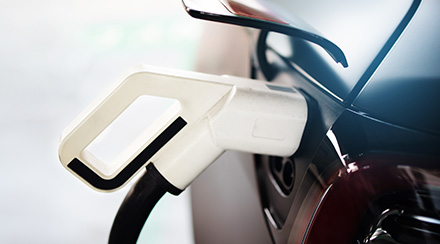Are Electric Cars Better than Gas Cars?

There are hundreds of thousands of electric cars on U.S. roads, and the number continues to grow as more drivers transition away from gasoline-powered vehicles. But buying any car is a high-involvement decision, and there are several pros and cons to electric cars that you’ll want to consider before making the switch.
Here’s how electric vehicles and gas-powered cars stack up in the key characteristics that will help you decide whether an EV is right for you:
Electric vs. Gas Cars
Fuel Costs
The biggest difference between EVs and gas-powered cars is, of course, the fuel. And while the prices of gasoline and electricity vary by location and are constantly changing, the fuel costs of electric vehicles are consistently lower than those of gas-powered cars.
EnergySage, an energy information portal and marketplace funded by the U.S. Department of Energy, reports that charging an electric car at home is about 3.5 times less expensive per mile than filling up with gas. Driving an EV compact sedan that is charged at home costs about four cents per mile on average, compared to 14 cents per mile in a comparable gas-powered car, according to EnergySage’s analysis.
Fuel Stations
As of 2022, there are about 145,000 gas stations in the U.S. compared to about 47,000 public EV charging stations. So while drivers of gas-powered cars usually don’t have to do much advance planning about when and where they’ll fuel up, EV drivers may need to plot out their recharging stops – especially if they’re taking a long road trip through rural areas.
Another thing to consider is that it only takes a few minutes to refill a gas tank, but it can take much longer to recharge an EV battery. Only a fraction of the public charging stations in the U.S. are DC fast chargers, also called level 3 chargers, which still take around 20 to 30 minutes to recharge a depleted battery. Level 2 chargers, which are more common, can take 8 to 12 hours to fully recharge a battery.
On the other hand, EV drivers can do something other drivers can’t: fuel up at home. If you have a level 2 charger at home and a long-range EV, you can drive hundreds of miles per day while relying only on home charging.

Home Charging
This is something drivers of gas-powered cars don’t have to worry about at all. But most EV drivers will find that installing a level 2 charging station at home is the only practical way to refuel.
EVs can be charged with a standard 120-volt outlet, which is called level 1 charging. But it can take 50 hours or more to fully recharge a depleted EV battery this way, which is too slow for most drivers. A level 2 charger requires a 240-volt outlet, which should be installed by a licensed electrician. The cost of installation can vary from a few hundred dollars to around $3,000 or more, depending on the condition and complexity of the existing home wiring.
Maintenance
Routine maintenance of an EV is much simpler than that of a gas-powered car. EVs don’t require motor oil, engine air filters, fuel filters and pumps, drive belts, spark plugs and other equipment that tends to need replacement over the lifetime of a vehicle. Most EV drivers only need to replace their wiper blades, windshield washer fluid, cabin air filters and tires as needed. Beyond that, most scheduled maintenance consists of periodic checks by professional mechanics to verify the performance of the battery, coolant system, electric motor and drivetrain.
This difference usually makes EVs less expensive and time-consuming to maintain. But there’s one maintenance consideration that is very important for EV drivers to remember: you may need to take your EV to a dealership for scheduled maintenance inspections to maintain the warranty. EV warranties often cover more miles and/or years of operation than warranties on gas-powered cars, so it’s especially important to keep them in good standing.
Range
With a gas-powered car, your range is as far as your wallet will take you – simply fuel up and keep going. But with an EV, it makes sense to think of the range in terms of how far you can go on a single charge. And that varies significantly by model.
If you browse the list of available EVs ranked by range at the Electric Vehicle Database, you’ll find vehicles with ranges around 100 miles, 700 miles and everything in between. Mileage range is one of the most important factors when shopping for a new EV, as you’ll want to choose a model that will get you through a typical day of driving on a single charge.
Keep in mind that EV batteries gradually lose capacity over time, which means that your maximum range is likely to slowly decrease over the life of the car. Other factors can limit the range further, including cold outdoor temperatures and how much energy you’re using with an EV’s non-driving systems, like heat and air conditioning.

Environmental Impact
Most drivers know that electric vehicles are better for the environment than gas-powered cars, but the question of how much better is complicated. Even though EVs don’t produce greenhouse gasses while they’re running, they must be charged with electricity – and that electricity might be generated from fossil fuels like natural gas and coal.
Throughout most of the U.S., the electricity in the grid comes from a variety of sources that include fossil fuels, nuclear power, solar energy, wind energy and hydropower. The exact mix of sources varies by location, so the carbon footprint of EV driving may be higher in some places than in others. But overall, the carbon footprint of EVs is lower than that of gas-powered cars, and is steadily improving as electric utilities transition to renewables.
Purchase Price
This is one disadvantage of electric cars: EVs are more expensive to purchase than similar gas-powered cars, typically by several thousand dollars. But the higher up-front cost can be recouped over time in the form of lower fuel costs and fewer maintenance expenses, and buyers may be able to qualify for a federal tax credit when they purchase a new EV. The tax credit only applies to the first 200,000 EVs sold by each manufacturer, so its availability depends on whether the manufacturer of your desired model has reached this cap.
Insurance
Electric vehicles are more expensive to insure than gas-powered cars – 15 percent more on average, according to MoneyGeek. This is due in part to the higher purchase price of EVs, but also because electric cars can be more expensive to repair after an accident. EVs have a greater number of vulnerable electronic sensors than most gas-powered cars, and EV parts are more likely to be replaced than repaired. Electric cars are also more likely to be totaled in an accident.
So, are electric cars better than gas cars? There is no one-size-fits-all answer – it all depends on your car-buying budget, priorities and driving habits. But if you do decide to go electric, you’re likely to enjoy savings on maintenance and fuel while doing your part to reduce greenhouse gas emissions.
Looking for Something Specific?
Select a category to find resources for topics that interest you.
Select Category

Related Articles:

Are Electric Cars Better for the Environment?
Electric cars produce virtually zero emissions while they’re being driven, but charging car batteries and the materials used to make these batteries have their own environmental impact. See how these effects balance out.
Read Article
Are Electric Cars Worth It?
Electric cars are becoming more popular among consumers and car makers for their impressive technology and positive environmental impact. When deciding whether an electric car is right for you, consider these benefits as well as the trade-offs.
Read Article
Are Electric Cars Cheaper in the Long Run?
The popularity of electric cars is growing as manufacturers introduce affordable models that can drive farther on a single charge. While great for the environment, are they great for your wallet?
Read ArticleMost Popular Articles

Electric Vehicle Guide
Whether you're deciding if an EV is right for you or setting up a home charger, our Electric Vehicle Guide can help you wherever you are in your EV journey. Learn More.
Are Electric Cars Better than Gas Cars?
There are hundreds of thousands of electric cars on U.S. roads, and the number continues to grow as more drivers transition away from gasoline-powered vehicles. But buying any car is a high-involvement decision, and there are several pros and cons to electric cars that you’ll want to consider before making the switch.
Here’s how electric vehicles and gas-powered cars stack up in the key characteristics that will help you decide whether an EV is right for you:
Electric vs. Gas Cars
Fuel Costs
The biggest difference between EVs and gas-powered cars is, of course, the fuel. And while the prices of gasoline and electricity vary by location and are constantly changing, the fuel costs of electric vehicles are consistently lower than those of gas-powered cars.
EnergySage, an energy information portal and marketplace funded by the U.S. Department of Energy, reports that charging an electric car at home is about 3.5 times less expensive per mile than filling up with gas. Driving an EV compact sedan that is charged at home costs about four cents per mile on average, compared to 14 cents per mile in a comparable gas-powered car, according to EnergySage’s analysis.
Fuel Stations
As of 2022, there are about 145,000 gas stations in the U.S. compared to about 47,000 public EV charging stations. So while drivers of gas-powered cars usually don’t have to do much advance planning about when and where they’ll fuel up, EV drivers may need to plot out their recharging stops – especially if they’re taking a long road trip through rural areas.
Another thing to consider is that it only takes a few minutes to refill a gas tank, but it can take much longer to recharge an EV battery. Only a fraction of the public charging stations in the U.S. are DC fast chargers, also called level 3 chargers, which still take around 20 to 30 minutes to recharge a depleted battery. Level 2 chargers, which are more common, can take 8 to 12 hours to fully recharge a battery.
On the other hand, EV drivers can do something other drivers can’t: fuel up at home. If you have a level 2 charger at home and a long-range EV, you can drive hundreds of miles per day while relying only on home charging.
Home Charging
This is something drivers of gas-powered cars don’t have to worry about at all. But most EV drivers will find that installing a level 2 charging station at home is the only practical way to refuel.
EVs can be charged with a standard 120-volt outlet, which is called level 1 charging. But it can take 50 hours or more to fully recharge a depleted EV battery this way, which is too slow for most drivers. A level 2 charger requires a 240-volt outlet, which should be installed by a licensed electrician. The cost of installation can vary from a few hundred dollars to around $3,000 or more, depending on the condition and complexity of the existing home wiring.
Maintenance
Routine maintenance of an EV is much simpler than that of a gas-powered car. EVs don’t require motor oil, engine air filters, fuel filters and pumps, drive belts, spark plugs and other equipment that tends to need replacement over the lifetime of a vehicle. Most EV drivers only need to replace their wiper blades, windshield washer fluid, cabin air filters and tires as needed. Beyond that, most scheduled maintenance consists of periodic checks by professional mechanics to verify the performance of the battery, coolant system, electric motor and drivetrain.
This difference usually makes EVs less expensive and time-consuming to maintain. But there’s one maintenance consideration that is very important for EV drivers to remember: you may need to take your EV to a dealership for scheduled maintenance inspections to maintain the warranty. EV warranties often cover more miles and/or years of operation than warranties on gas-powered cars, so it’s especially important to keep them in good standing.
Range
With a gas-powered car, your range is as far as your wallet will take you – simply fuel up and keep going. But with an EV, it makes sense to think of the range in terms of how far you can go on a single charge. And that varies significantly by model.
If you browse the list of available EVs ranked by range at the Electric Vehicle Database, you’ll find vehicles with ranges around 100 miles, 700 miles and everything in between. Mileage range is one of the most important factors when shopping for a new EV, as you’ll want to choose a model that will get you through a typical day of driving on a single charge.
Keep in mind that EV batteries gradually lose capacity over time, which means that your maximum range is likely to slowly decrease over the life of the car. Other factors can limit the range further, including cold outdoor temperatures and how much energy you’re using with an EV’s non-driving systems, like heat and air conditioning.
Environmental Impact
Most drivers know that electric vehicles are better for the environment than gas-powered cars, but the question of how much better is complicated. Even though EVs don’t produce greenhouse gasses while they’re running, they must be charged with electricity – and that electricity might be generated from fossil fuels like natural gas and coal.
Throughout most of the U.S., the electricity in the grid comes from a variety of sources that include fossil fuels, nuclear power, solar energy, wind energy and hydropower. The exact mix of sources varies by location, so the carbon footprint of EV driving may be higher in some places than in others. But overall, the carbon footprint of EVs is lower than that of gas-powered cars, and is steadily improving as electric utilities transition to renewables.
Purchase Price
This is one disadvantage of electric cars: EVs are more expensive to purchase than similar gas-powered cars, typically by several thousand dollars. But the higher up-front cost can be recouped over time in the form of lower fuel costs and fewer maintenance expenses, and buyers may be able to qualify for a federal tax credit when they purchase a new EV. The tax credit only applies to the first 200,000 EVs sold by each manufacturer, so its availability depends on whether the manufacturer of your desired model has reached this cap.
Insurance
Electric vehicles are more expensive to insure than gas-powered cars – 15 percent more on average, according to MoneyGeek. This is due in part to the higher purchase price of EVs, but also because electric cars can be more expensive to repair after an accident. EVs have a greater number of vulnerable electronic sensors than most gas-powered cars, and EV parts are more likely to be replaced than repaired. Electric cars are also more likely to be totaled in an accident.
So, are electric cars better than gas cars? There is no one-size-fits-all answer – it all depends on your car-buying budget, priorities and driving habits. But if you do decide to go electric, you’re likely to enjoy savings on maintenance and fuel while doing your part to reduce greenhouse gas emissions.
Looking for Something Specific?
Select a category to find resources for topics that interest you.
Select Category

Related Articles:

Are Electric Cars Better for the Environment?
Electric cars produce virtually zero emissions while they’re being driven, but charging car batteries and the materials used to make these batteries have their own environmental impact. See how these effects balance out.
Read Article
Are Electric Cars Worth It?
Electric cars are becoming more popular among consumers and car makers for their impressive technology and positive environmental impact. When deciding whether an electric car is right for you, consider these benefits as well as the trade-offs.
Read Article
Are Electric Cars Cheaper in the Long Run?
The popularity of electric cars is growing as manufacturers introduce affordable models that can drive farther on a single charge. While great for the environment, are they great for your wallet?
Read ArticleMost Popular Articles

Electric Vehicle Guide
Whether you're deciding if an EV is right for you or setting up a home charger, our Electric Vehicle Guide can help you wherever you are in your EV journey. Learn More.







